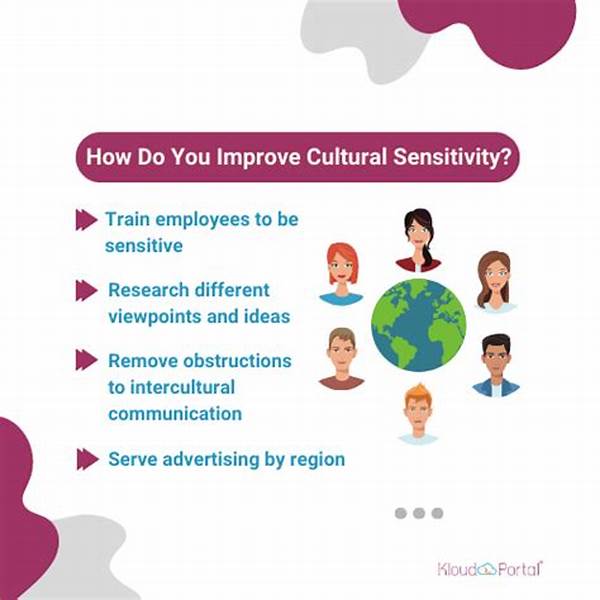Understanding the nuances of different cultures is not just important; it’s essential in the interconnected world of diplomacy and international politics. Cultural sensitivity in international relations refers to the awareness and respect of cultural differences, striving to bridge gaps while fostering mutual understanding. This practice not only smooths over misunderstandings but can actively prevent conflicts. As states and organizations from varied cultural backgrounds interact, being attuned to these differences becomes crucial for successful diplomacy and collaboration.
Read Now : High-energy Workout Music Playlist
The Importance of Cultural Sensitivity
In international dealings, cultural sensitivity acts as a crucial ingredient for peace and unity. Imagine a world without it — misunderstandings would be rampant, and diplomacy could easily spiral into conflict. By understanding and valuing cultural nuances, diplomats and international leaders pave the way for successful negotiations and policy-making. Cultural sensitivity in international relations ensures that global exchanges remain respectful, effective, and devoid of unintended slights. It’s not just about avoiding faux pas; it’s about appreciating the rich tapestry of global diversity that makes international cooperation fruitful and harmonious.
In the fast-paced arena of global politics, overlooking cultural differences can be disastrous. The art of diplomacy relies heavily on shared respect and understanding. Without cultural sensitivity, even the most well-intentioned gestures can go awry. It’s crucial for leaders and diplomats to embrace cultural sensitivity in international relations, as it facilitates genuine connections and fosters an environment where all parties feel valued and heard. So next time you think about international relations, remember — cultural sensitivity is the secret sauce that keeps things running smoothly!
Slang Style Tips for Cultural Sensitivity
1. Chill, It’s Cultural: When dealing with international peeps, remember that differences are just part of the gig. Cultural sensitivity in international relations is all about keeping things cool and understanding everyone’s unique scene.
2. Tune In, Don’t Zone Out: Pay attention to cultural cues. In international dealings, cultural sensitivity can make or break the vibe. Dive into the culture, and don’t just skim the surface.
3. Keep It Real: Honesty and openness about cultural differences can build trust. Cultural sensitivity in international relations means being real and respectful about where everyone’s coming from.
4. Adapt and Flex: Rigidity doesn’t work in dynamic international arenas. Cultural sensitivity is about adapting and showing flexibility in understanding cultural norms.
5. Laugh It Off: Mistakes happen, even with the best intentions. A bit of humor and lightheartedness can go a long way. Cultural sensitivity in international relations isn’t about being perfect but about being mindful.
Why Cultural Sensitivity Matters
In the realm of global diplomacy, cultural sensitivity can be the difference between a successful negotiation and a diplomatic kerfuffle. Taking a step back to appreciate the culture you’re engaging with is crucial. It’s like adding the right spices to a dish; everything vibes together beautifully! Cultural sensitivity in international relations ensures that interactions are not laden with misunderstandings. It’s about embracing the uniqueness of each culture and harnessing that diversity as a strength.
When these diverse interactions are handled with cultural sensitivity, international relations become not just functional but thriving. The vibe shifts from one of potential tension to one where mutual respect and understanding form the core. Imagine a boardroom of multicultural diplomats, where respect and cultural appreciation bounce off the walls. That’s the dream! Navigating this space with cultural sensitivity ensures alliances and partnerships don’t just form—they last.
Read Now : Find Rising Indie Talents
Cultural Sensitivity: Beyond Borders
Engaging in international dialogue without cultural sensitivity is like trying to read a book without understanding the language. You miss the essence. Recognizing and valuing cultural differences allows international agents to engage meaningfully, preventing the misinterpretations that can derail major agreements. It’s like having an all-access pass to the world’s cultural intricacies — and that’s something no diplomat should travel without. Cultural sensitivity in international relations isn’t just a skill; it’s an art form that leads to effective and empathetic global leadership.
Successful international relations demand an adherence to cultural understanding. When nations interact with cultural sensitivity at the forefront, decisions become more inclusive. Policies and negotiations reflect a harmonious blend of the world’s cultures. This enriches outcomes and ensures peace and cooperation are more than just buzzwords. It’s the kind of cultural awareness that takes international relations from mere interactions to impactful collaborations.
Getting Into the Groove of Cultural Sensitivity
Alright, so you wanna ace the game of international diplomacy, right? Well, saddle up because this ride needs some serious cultural sensitivity in international relations. It’s like, imagine throwing a massive party but not checking if your guests dig the same groove as you do. It’s all about creating connections that are not just skin-deep but truly meaningful.
The trick is to step into their shoes, get a feel for their jam, and vibe with their unique culture. When you rock at cultural sensitivity, those international talks turn into meaningful dialogues, not random chit-chats. Suddenly, you’re not just sharing a table with different countries; you’re sharing ideas, dreams, and possibilities that transcend borders. So, next time you’re in an international meetup, think of it as a cultural cocktail mix — every ingredient has its own zing!
Wrapping It All Up
To put it simply, cultural sensitivity in international relations is the ticket to a harmonious world stage. It’s about dialing into different cultural nuances and jamming with them rather than clashing against them. This sensitivity is not just the cherry on top of international discourse; it’s the bottom line that makes the whole thing tick.
So next time the world feels a little disconnected, remember the power of cultural sensitivity. It’s the bridge that connects, the language everyone speaks, and the rhythm that everyone dances to — well, in the perfect world, anyway! By nurturing this attribute, international relations can enjoy a seamless flow of ideas, cooperation, and peace that’s both modern and timeless.
